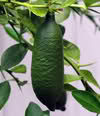Citrus leafminer does not have other hosts besides plants in the citrus family Rutaceae, does not damage fruit and only damages young leaves. To mature citrus it is merely a cosmetic pest of the leaves and has little to not effect on the yields or quality of fruit. The concern is that citrus leafminer can cause sufficient foliar damage to 1-3 year old citrus, and will need to be controlled during that period. Establishment of citrus leafminer also causes changes to nurseries that have to comply with state protocols prior to shipping trees, and may also cause a decrease in sales to homeowners who are unwilling to buy trees with knured leaves or trees where the leaves have been stripped. For mature commerical citrus, control of citrus leafminer is a combination of biological control and tolerance. Despite how bad trees may look, research out of Florida suggests that there are no negative impacts on yield or quality of fruit, and that this pest can therefore be ignored. As for biocontrol it is anticipated that a native parasitoid, Cirrospilus coachellae, that currently attacks citrus peelminer will attack and provide some suppression of citrus leafminer. However, the level of which it is controlled is uncertain. There are also other candidate parasitoid species that are being considered for importation into the USA. The major concern is related to control in nurseries and young orchards. Control programs in these situation is chemically intensive, and efforts are underway to develop and document the best management options available. - Millet










